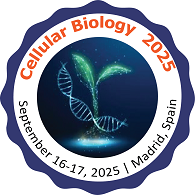Call for Abstract
Scientific Program
5th Experts Meeting on Plant, Cellular and Molecular Biology, will be organized around the theme “Plant Intelligence: Cellular Insights, Molecular Solutions”
Cellular Biology-2025 is comprised of keynote and speakers sessions on latest cutting edge research designed to offer comprehensive global discussions that address current issues in Cellular Biology-2025
Submit your abstract to any of the mentioned tracks.
Register now for the conference by choosing an appropriate package suitable to you.
This track explores plant nutrition and soil management to enhance crop yields and sustainability. Topics include nutrient dynamics, soil fertility, and sustainable agricultural practices aimed at reducing environmental impacts and improving soil health.
This track covers the broad field of plant science, including the study of plant life, evolution, morphology, and interactions with the environment. It explores how plants have influenced human history, from early herbalism to advanced research in botany. Topics focus on plant taxonomy, physiology, ecology, and applied fields such as horticulture and agronomy.
Here, the focus is on the molecular mechanisms within plants. Plant Molecular Biology studies how genetic information is expressed in plants, impacting their structure and function. Plant Biochemistry investigates the chemical processes plants use for growth, metabolism, and defense. Both fields contribute to agricultural innovation and pharmaceutical applications.
This session explores techniques in plant biotechnology to develop crops with improved traits like disease resistance, higher yield, or environmental adaptability. This track focuses on genetic modifications and biotechnological applications to address global food security and environmental sustainability.
Phytotechnologies and nanotechnology applied to plant sciences (phytonanotechnology) have the potential to revolutionize agriculture. This includes the use of nanoparticles for controlled release of agrochemicals, disease resistance, and enhancing crop yield. However, safety and environmental concerns are also addressed.
This track covers plant diseases caused by pathogens fungi, bacteria and environmental stress, alongside Bryology, the study of non-vascular plants like mosses. Research in this area aids in disease management and understanding plant evolution from primitive forms.
Here, plant diseases caused by pathogens like fungi are studied in detail, alongside Mycology, the study of fungi. Understanding how fungi affect plants helps in developing methods for disease prevention, pest control, and improving crop health.
Plant hormones (phytohormones) regulate plant growth and development. This session will focus on how hormones like Auxin, Cytokinin, and Gibberellin control various physiological processes like cell growth, flowering, and fruit ripening. The use of plant hormones in agriculture and pharmaceuticals will also be discussed.
This track deals with the chemical compounds produced by plants and their applications in medicine and cosmetics. It includes studies of bioactive compounds that are used for therapeutic purposes, as well as the growing popularity of plant-based products in cosmetics due to their antimicrobial and antioxidant properties.
This session focuses on manipulating plant metabolism through genetic engineering to enhance the production of valuable compounds, such as pharmaceuticals, biofuels, and other industrial chemicals. It’s a growing field that bridges biotechnology with commercial applications.
This track focuses on cryobiology, the study of freezing plants for long-term storage and conservation. Techniques like cryopreservation, seed banking, and genetic material preservation will be discussed as tools for conserving rare and endangered plant species. It also explores the broader role of cryobiology in plant breeding and biodiversity conservation.
Plant Tissue Culture covers techniques like micro propagation for cloning plants and conserving endangered species. This session also looks at the use of tissue culture in improving crop varieties with enhanced disease resistance and stress tolerance.
This session covers the study of plant genetics and the mapping of plant genomes. Genomics helps in crop improvement by identifying genes related to disease resistance, growth, and yield. It also includes applications in biotechnology for genetically modified crops.
Bioinformatics tools are essential for managing and analyzing vast amounts of data from genome sequencing projects. This track focuses on the application of computational tools in plant biology, including genome annotation, gene expression analysis, and the improvement of crops through computational predictions. These sessions provide a comprehensive overview of plant science, covering both basic research and applied technologies that have the potential to revolutionize agriculture, medicine, and biotechnology.
This track focuses on how plants adapt to changing climatic conditions, including altered temperatures, droughts, and extreme weather events. Topics include genetic adaptations, physiological responses to climate stress, and strategies for breeding climate-resilient crops. The role of plants in mitigating climate change, such as carbon sequestration, will also be explored.
This session explores the complex relationship between plants and the soil microbiome. It covers how soil microbes influence plant health, nutrient uptake, and stress tolerance. Research in this area may reveal new strategies for improving soil health and sustainable agricultural practices through microbial interventions and the manipulation of plant-microbe interactions.
This track highlights the emerging field of synthetic biology applied to plant systems. Topics include designing novel plant metabolic pathways, creating synthetic plant materials, and engineering plants to perform new functions such as biofuel production or environmental remediation. The potential and challenges of synthetic biology in agriculture and biotechnology will be discussed.
This session delves into the evolutionary history of plants, using phylogenetic techniques to understand plant diversification and the genetic relationships between plant species. Research in this track can provide insights into the origin of plant traits, the evolution of major plant groups, and the conservation of genetic diversity in plants.
This track explores the therapeutic potential of plants for the treatment of diseases. Topics include the extraction, identification, and application of medicinal compounds derived from plants for pharmacological purposes. Researchers will also discuss the challenges and benefits of developing plant-based drugs, as well as their role in traditional and modern medicine.
Urban agriculture and vertical farming are growing fields aimed at increasing food production in urban environments. This session will cover the latest innovations in plant cultivation within cities, including the use of hydroponics, aeroponics, and controlled-environment agriculture systems. The role of plant science in creating sustainable, local food sources will be emphasized.

